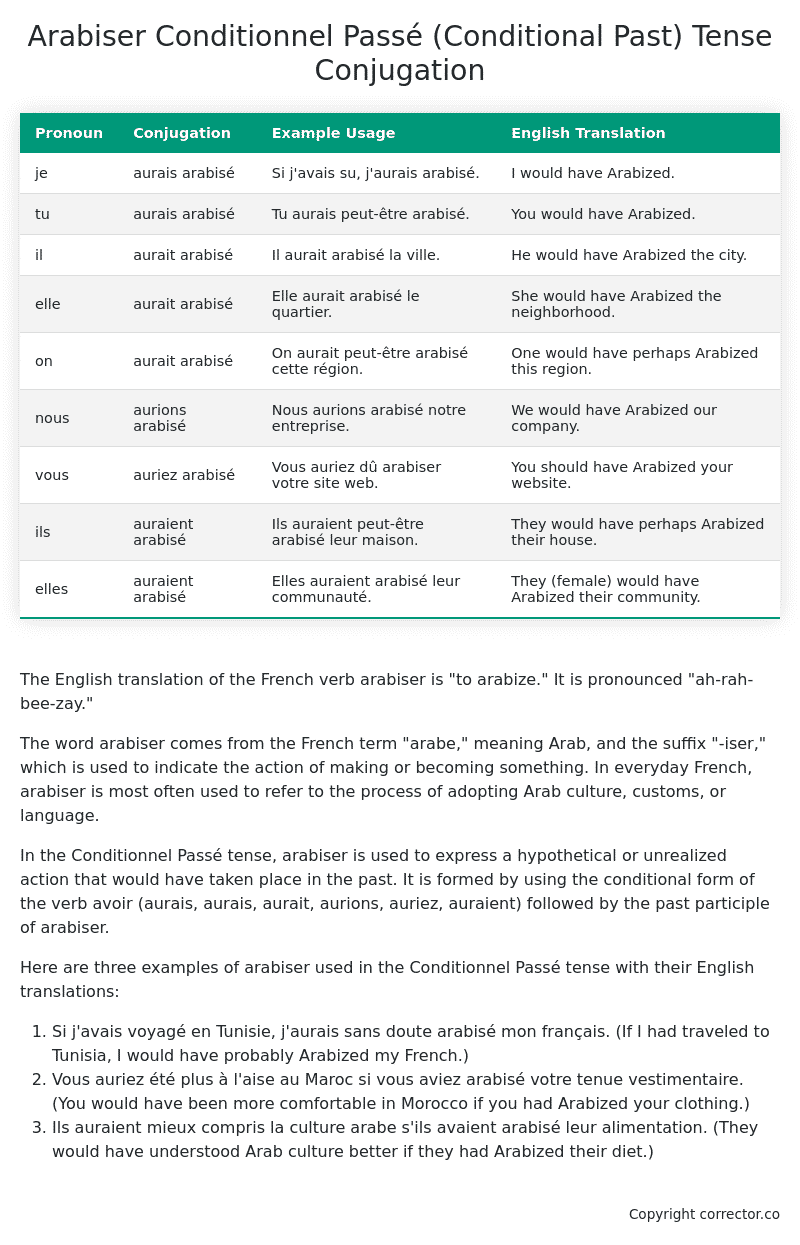Conditionnel Passé (Conditional Past) Tense Conjugation of the French Verb arabiser
Introduction to the verb arabiser
The English translation of the French verb arabiser is “to arabize.” It is pronounced “ah-rah-bee-zay.”
The word arabiser comes from the French term “arabe,” meaning Arab, and the suffix “-iser,” which is used to indicate the action of making or becoming something. In everyday French, arabiser is most often used to refer to the process of adopting Arab culture, customs, or language.
In the Conditionnel Passé tense, arabiser is used to express a hypothetical or unrealized action that would have taken place in the past. It is formed by using the conditional form of the verb avoir (aurais, aurais, aurait, aurions, auriez, auraient) followed by the past participle of arabiser.
Here are three examples of arabiser used in the Conditionnel Passé tense with their English translations:
- Si j’avais voyagé en Tunisie, j’aurais sans doute arabisé mon français. (If I had traveled to Tunisia, I would have probably Arabized my French.)
- Vous auriez été plus à l’aise au Maroc si vous aviez arabisé votre tenue vestimentaire. (You would have been more comfortable in Morocco if you had Arabized your clothing.)
- Ils auraient mieux compris la culture arabe s’ils avaient arabisé leur alimentation. (They would have understood Arab culture better if they had Arabized their diet.)
Table of the Conditionnel Passé (Conditional Past) Tense Conjugation of arabiser
| Pronoun | Conjugation | Example Usage | English Translation |
|---|---|---|---|
| je | aurais arabisé | Si j’avais su, j’aurais arabisé. | I would have Arabized. |
| tu | aurais arabisé | Tu aurais peut-être arabisé. | You would have Arabized. |
| il | aurait arabisé | Il aurait arabisé la ville. | He would have Arabized the city. |
| elle | aurait arabisé | Elle aurait arabisé le quartier. | She would have Arabized the neighborhood. |
| on | aurait arabisé | On aurait peut-être arabisé cette région. | One would have perhaps Arabized this region. |
| nous | aurions arabisé | Nous aurions arabisé notre entreprise. | We would have Arabized our company. |
| vous | auriez arabisé | Vous auriez dû arabiser votre site web. | You should have Arabized your website. |
| ils | auraient arabisé | Ils auraient peut-être arabisé leur maison. | They would have perhaps Arabized their house. |
| elles | auraient arabisé | Elles auraient arabisé leur communauté. | They (female) would have Arabized their community. |
Other Conjugations for Arabiser.
Le Present (Present Tense) Conjugation of the French Verb arabiser
Imparfait (Imperfect) Tense Conjugation of the French Verb arabiser
Passé Simple (Simple Past) Tense Conjugation of the French Verb arabiser
Passé Composé (Present Perfect) Tense Conjugation of the French Verb arabiser
Futur Simple (Simple Future) Tense Conjugation of the French Verb arabiser
Futur Proche (Near Future) Tense Conjugation of the French Verb arabiser
Plus-que-parfait (Pluperfect) Tense Conjugation of the French Verb arabiser
Passé Antérieur (Past Anterior) Tense Conjugation of the French Verb arabiser
Futur Antérieur (Future Anterior) Tense Conjugation of the French Verb arabiser
Subjonctif Présent (Subjunctive Present) Tense Conjugation of the French Verb arabiser
Subjonctif Passé (Subjunctive Past) Tense Conjugation of the French Verb arabiser
Subjonctif Imparfait (Subjunctive Imperfect) Tense Conjugation of the French Verb arabiser
Subjonctif Plus-que-parfait (Subjunctive Pluperfect) Tense Conjugation of the French Verb arabiser
Conditionnel Présent (Conditional Present) Tense Conjugation of the French Verb arabiser
Conditionnel Passé (Conditional Past) Tense Conjugation of the French Verb arabiser (this article)
L’impératif Présent (Imperative Present) Tense Conjugation of the French Verb arabiser
L’infinitif Présent (Infinitive Present) Tense Conjugation of the French Verb arabiser
Struggling with French verbs or the language in general? Why not use our free French Grammar Checker – no registration required!
Get a FREE Download Study Sheet of this Conjugation 🔥
Simply right click the image below, click “save image” and get your free reference for the arabiser Conditionnel Passé tense conjugation!

Arabiser – About the French Conditionnel Passé (Conditional Past) Tense
Formation
Common Everyday Usage Patterns
Expressing Unreal Past Scenarios
Polite Requests or Suggestions
Expressing Doubt or Uncertainty
Interactions with Other Tenses
Conditional Present
Indicative Past Tenses
Conditional Future
Summary
Want More?
I hope you enjoyed this article on the verb arabiser. Still in a learning mood? Check out another TOTALLY random French verb conjugation!


